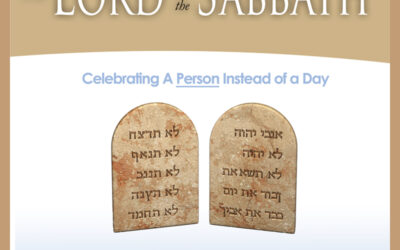Abraham had an assignment for his life, as did Joseph. Moses was called to perform a specific life-task. David had a destiny. So did Daniel, Jeremiah, and all the prophets. Esther was raised up “for such a time as this.” John the Baptist fulfilled a definite role, as did Peter and John. Paul had a purpose, a reason for being.
Only a few of these people realized what their work was. Most of them were like you and me: we only come into an awareness of our purpose slowly. Everything seems ordinary and mundane; we feel like there is nothing special about us, no calling we could possibly fulfill. Moses is a striking example. The first forty years of his life were spent learning how to be a prince of Egypt. The next forty years of his life were spent in the desert, unlearning everything he had been taught. It seemed like a huge waste of a life. When God sent him back to Egypt at the age of eighty, Moses still did not understand or appreciate the full extent of what God was calling him to do. Neither did the Hebrews. But now we understand that God had a purpose for him all along.
Or look at Joseph. At an early age he senses God’s call on his life for something special. But things do not go the way he expects them to go (things seldom do). His brothers first seek to kill him, but then settle for selling him to the slave-traders. His situation improves for awhile, but then he is framed for something he did not do and gets thrown into the dungeon. As the years slipped away Joseph must have believed he’d made a mistake when he thought he heard from God. But when we see the final result everything makes perfect sense. God used those experiences to shape and mold his character, and to prepare him for the work he was called to do.
And consider Noah. In Genesis 9:1 we see that God blessed Noah and his sons. The blessing of the Lord means divine favor and approval. How do you feel when someone ELSE gets blessed? Are you happy for them? Envious? Frustrated? All we see is the end result – but we do not see all the labor, the sweat, the tears, the pain, the struggle, the misunderstanding, the confusion, the dark nights, all the things that person has endured in order to have the blessing of the Lord. I am not saying the blessing is something we can earn through self-effort; but the blessing of the Lord is the benefit of fulfilling the work He has called us to do.
In this writing we will look at the life of Noah, learn the universal principles behind the work that God blesses, and apply those principles to our lives as well. They are not complicated principles, but very, very simple. I pray they will encourage and strengthen all of us to persevere in whatever situation the Lord has placed us.
A Heritage of Walking With God
The story of Noah begins over four hundred years before he was born. The Scriptures tell us that Noah’s great-great grandfather was Enoch. We know Enoch was a man who walked with God and suddenly disappeared, for God took him. Exactly what that means we can only speculate, but this much is clear: Enoch had a close relationship with the Lord.
Enoch was also a prophet. Jude 14, in the New Testament, records one of his prophecies of a future judgment. But a little closer to his own time, Enoch perceived that the Lord was about to execute judgment on the earth. So when Enoch had a son he named him “Methuselah.” You remember Methuselah is the oldest person in the Bible, living to the ripe old age of 969. The name “Methuselah” has prophetic significance. Most Bible reference books give the meaning as “dart man” or “man of the spear”. A less frequently found definition is of Chaldean origin and means something a little more intriguing: “at his death, the sending forth.” The sending forth of what?
Perhaps that makes no sense to us – until we use the chronology provided to us in Genesis 5. All the generations of Noah are given to us with the exact time frames in which they lived and died. Enoch had a son named Methuselah, Methuselah had a son named Lamech, and Lamech had a son named Noah. When we do the calculations from Enoch to Noah, we find that Noah finished building the ark the same year his grandfather Methuselah died, just in time for the “sending forth” of a great flood – exactly 969 years after Enoch said that it would come.
So this judgment had been building for nearly a millennium. Enoch knew it was coming. Certainly Methuselah knew. Presumably Lamech knew. But none of them were called to build the ark. That work was reserved for Noah. And even then, he was five hundred years old before God revealed His purpose for Noah. Think about it: Noah walked with God for five hundred years before God gave him the plans for building the ark. If the man is not right then the plans are not right; but after five hundred years of relationship-building, the Lord finally said, “Now I can trust you to do the work I have called you to do. The survival of all life on earth depends on it.” What an awesome responsibility!
The Lord Blesses Us to Be a Blessing
That brings us to the first principle: the work that God blesses is bigger than us. The ark was not Noah’s private little retreat. It was not his personal little ministry, his private little vision. Of course, Noah and his family were beneficiaries of the work, but the purpose of the ark was to preserve all living things. Otherwise, Noah would have built a much smaller vessel.
When the Lord gives us a work to do it will be bigger than ourselves. The size of a person’s heart may be judged by the size of their work. By size I do not mean numerical or financial strength. I mean this: is the work larger than the person working? Is it fulfilling a purpose far greater than the people involved? I say this because I am convinced that most churches exist only because the pastor needs a place to preach. Entire ministries are created to give some man or woman an audience. What a tragedy that is. Yesterday I drove past a little building that calls itself a church. The church was named after the presiding elder: “Smith Apostolic Church” (not the real name, but a true story). Such work fulfills nothing of eternal significance, it only meets the self-serving needs and aspirations of the person leading it.
The work that God blesses is not merely for our own personal benefit, but for the benefit of the Body of Christ, for the Kingdom of God. Our vision must carry us beyond ourselves; our vision must survive us. The only vision that is bigger than ourselves is Christ. If our vision is Christ then we are building upon an eternal foundation, and the Lord will bless that labor. Noah carried the Messiah in his loins – the ark was meant to preserve not just physical life, but a spiritual lineage. Thus, it was bigger than Noah, and the Lord blessed the work.
The Lord Blesses What We Cannot Do On Our Own
The second principle is closely related to the first, and it is this: the work that God blesses is beyond our ability to do on our own. In other words, if I can do it all by myself, then I do not need the blessing of the Lord. I can simply call upon my natural talent, experience, and skill to do what needs to be done. Now, work done in this manner may or may not be successful, but irregardless, it is MY work; it is not the Lord’s work, and it does not enjoy the blessing of the Lord.
The Lord delights to place us in impossible situations. Noah was no shipbuilder. Yet God calls him to do the very thing he cannot do and gives him specific and detailed plans for doing it. The sheer size and scope of the work is astounding. First, Noah is to build a boat. Not just a little fishing boat, but a floating fortress with three levels in it. The Living Bible gives the dimensions as 450 feet long, 75 feet wide, and 45 feet high. Nothing this large had ever been constructed. The project would take one hundred years to complete. But the most amazing thing about this huge boat is that it was built on dry land. The Bible says Noah had faith (cf. Hebrews 11:7)!
But building the ark was only part of the work. After the ark was complete, there was the issue of bringing every sort of animal and bird into the boat. In the movies you see the animals streaming towards the ark of their own accord while Noah looks on in amazement. Perhaps that is the way it happened. Yet the Scripture says that the Lord told Noah to go get them and bring them into the ark (cf. Genesis 6:19). He had to go and gather them. How does one go about gathering one male and one female of every kind of animal in the world? And with some species God said to get seven pairs!
Then there is the matter of food. The Lord told Noah to gather samples of every kind of food that is eaten (cf. Genesis 6:21). The food was for feeding his family and all the animals, but it was also for future planting. Today we have fruits, vegetables, nuts, and grains because Noah somehow managed to find them all and store them in the ark. Now I ask: is it humanly possible to do all the things Noah did? Can someone with no experience build a boat that large? Can an ordinary person gather together every kind of beast, bird, and bug? Can anyone gather together every kind of food in the world, and store it? The Bible says, “Thus did Noah; according to all that God commanded him, so did he” (Genesis 6:22). When God asks us to do the impossible, we can ask for, and expect to receive, the blessing of the Lord on our work. He will show us what to do, and He will enable us to do it.
The Lord Blesses Obedience, Not Originality
The third and final principle is this: the work that God blesses is originated by God Himself. This is one of the most important lessons we can learn. I spent many years creating and executing my own plans, asking the Lord to bless them. One day I understood that instead of always trying to get the Lord to bless what I wanted to do, it was much simpler to find out what the Lord wanted to bless, and simply do THAT. Instead of trying to get God to come down to my level and do what I wanted, it was far better to come onto the Lord’s ground and do what He wanted. Great synergy and blessing is released when we simply cooperate with what God has already purposed to do. Heaven backs us up with tremendous power and authority. Instead of trying to make something happen, I simply flow in a current that already exists. The Lord will deny no request that is in agreement with what He Himself has originated.
Noah could expect the blessing of the Lord on his work because he was simply carrying out what the Lord had already determined to do. It is so much easier this way. Often the greatest hindrance to the best is the good. The greatest hindrance to Isaac is Ishmael. There are many good things we can create, many good things we can do. But only one thing is needed (cf. Luke 10:42). We have to discover the “one thing,” and we only discover it when we are seated at the feet of Jesus. When we are only motivated by what JESUS needs, not what MAN needs and not what we think WE need, then we are on the path of continual and perpetual blessing.
Noah walked with God, and Noah found grace in the eyes of the Lord (cf. Genesis 6:8,9). It took five hundred years of walking with God, but Noah found grace, and that made it all worthwhile. Let us learn to do nothing apart from this amazing grace. It is better to wait five hundred years for grace than to work for five minutes without it. What is grace? I teach people that Grace is a Man. Amazing Grace is simply Jesus living in me, doing what I cannot do. It does not matter if “what I cannot do” is save myself, overcome sin, love my neighbor, or build an ark. “For by Grace (Jesus) are you saved through faith (trusting Jesus to do what you cannot do); and that not of yourselves: it (He) is the Gift of God” (Ephesians 2:8). I am insufficient; but His Grace (Jesus) is sufficient. His Grace (Jesus) is more than enough. His Grace (Jesus) is Infinite Supply! But “without Me you can do nothing” (cf. John 15:5b).
Be encouraged. The Lord has a purpose for you, and a destiny for you to fulfill. But things will not always go the way you think they should. That is because the Lord calls you to something bigger than yourself, something beyond your ability, something you cannot originate or perpetuate without Him. It takes time. Noah walked with God for five hundred years and spent one hundred years building the ark. Abraham was one hundred years old before he finally saw God’s promise come true. Moses spent forty years in Egypt, then forty years in the desert, before God sent him to Pharaoh. Jesus prepared thirty years for an earthly ministry of three and a half years. Dear brother, dear sister: walk with God. Find Grace. Discover the One Thing. Focus on being, not doing. And when it IS time for you to do something you can be confident that your labor of love will be the work that God blesses. Amen.












